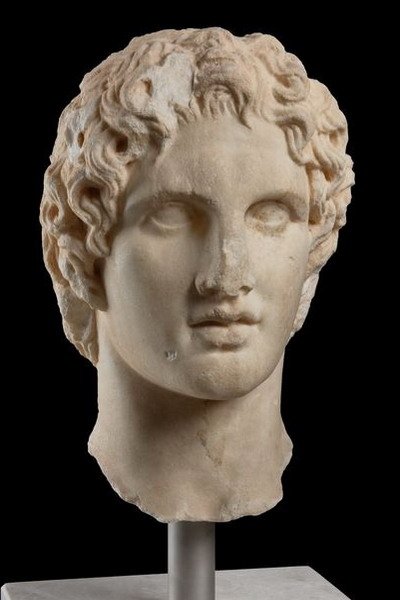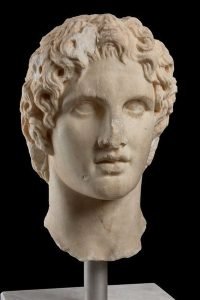Alexander the Not so Great



Alexander III of Macedon son of King Philip II is renowned as one of the worlds greatest military commanders. At the age of age of 18, he brought down the greatest (Persian) empire the (western) world knew of and by the age of 33, he had conquered much of the known world, but many stories are not exactly truthful. It's generally agreed that as a child, Alexander had a passion for philosophy. He attended lectures at Mieza and was tutored by Aristotle. While there, Alexander met Hephaestion who would become his life-long lover and confidant, and the second most powerful man in the expanded Greek empire. It's said that Aristotle described the relationship between Alexander and Hephaestion as one soul abiding in two bodies. When it came to war, Alexander happened to be in the right place at the right time or in other words he was well placed to take advantage. Before his time the Persians had been a continuous menace to the Greeks and had invaded Greece several times. But the Greeks had improved their military technology and Alexander was in a position to teach the Persians a lesson and get revenge but was this all? There is another factor few have considered. One may recall the legend of Jason and the Argonauts going in search of the golden fleece? More simply they went in search of gold and took the sea route aver the Black Sea to the lowlands of the Volga - the Caspian Sea - Aral Sea to the Amu Darya (Oxus) River into northern India where fine gold to this day is still collected using sheep skins. Some of these adventurers may have remained to become the first Greek settlers forming what would become the Greco-Bactrian Kingdom and perhaps there was regular trade and migration? If Alexander had knowledge of this, perhaps he sought to not only get revenge on the Persians, but also to unite the empire. What do you think? Many books have been written about Alexander, but the general story goes is that he pushed his way across Persia destroying Persepolis, up into the region of Bactria or northern Afghanistan butchering tens of thousands and introducing elements of Greek culture while leaving the local populations destitute. His victories were not all gained through military prowess, some were no doubt gained by siding with local warlords.Alexander seemed unable to quench his thirst for global conquest but when he arrived on the borders of India, in the ensuing war with King Porus, Alexander had no answer to the Hindu kings war tactics. The elephants of King Porus destroyed most of Alexander's army and he was deeply wounded leaving him with no option but to surrender and retreat. Porus was a king of the Pauravas in what is now the Punjab, yet even today although Greek historians have acknowledged the fact of Alexander's defeat, most of the worlds textbooks and websites like Wikipedia claim that Alexander was victorious but so impressed by the fight and military strategy put up by Porus, that he allowed Porus to retain his position. The stories of Alexander and the battle of Hydaspes against Indian King Porus continue to be faked, but the reality is that Alexander lost. It is only years after Greek historians disclosed this actual fact, the knowledge of King Porus is circulating.
Alexander’s invasion of India is regarded as a huge Western victory against the disorganised East. But according to Marshal Gregory Zhukov, the largely Macedonian army suffered a fate worse than what Napoleon suffered in Russia.
After the great victory of King Porus over Alexander in the battle of Hydaspes, India has produced many legendary hero's such as: Vikramaditya, Chandragupta, Prithviraj, Maha Rana Pratap, Shivaji, Ranjith Singh. Great Empires like Vijayanagara, Mauryan, Magadha, Maratha, Rajput. The surprise is, most Indians don't know this history of India. Alexander notoriously destroyed the great city of Persepolis
The city of Persepolis was the ceremonial capital of the first Persian (Achaemenid) Empire which dated from 550 BCE-330 BCE. Some scholars and historians suggest that Alexander destroyed it as an act of revenge for the burning of Athens during the second Persian invasion of Greece in 480 BCE.
Persepolis was chosen by King Cyrus the Great as the capital of Persia, but it was built on democratic principals which were later attributed to the Greeks however democracy and the panchayat system had long been practiced in India.
Persepolis today is a UNESCO World Heritage Site and the great waterway connecting India to the Mediterranean became unusable due to climate change then totally destroyed by Soviet irrigation draining the Amu Darya.
DISCLAIMER: The author is solely responsible for the views expressed in this article. The author carries the responsibility for citing and/or licensing of images utilized within the text.
